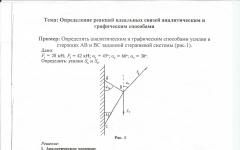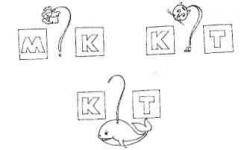What do you think is important when learning foreign languages? "Motivation, good teacher and having free time,” you say. Others will answer: "Main - effective technique and the best teaching aids! But has it ever occurred to you that the organization educational materials also plays important role? If not, then this article is just for you.
Since school, we have been accustomed to keeping a notebook-dictionary for recording foreign words, grammar notebook, workbook, homework notebook, etc. This entire stack consists of irreplaceable and important elements, which are necessary for educational process. However, you must admit that it is not very convenient to always carry a collection of notebooks with you. If you forget one of them, you will be left without materials that may be useful in the learning process.
Our advice is to change your habits. Get a notebook instead "ring blinder"(ring binder), which will become an assistant in learning foreign languages.
Advantages of a folder"ring blinder". How to increase the effectiveness of classes?
1) Classify information.
Having this notebook means categorizing the material you learned in class. There is no need to write down information linearly: the notebook has rings on which you can attach not only sheets of the format you need, but also separators. So, you can create several sections: “grammar”, “new words”, “ written works" etc. Thanks to the bright dividers, you can easily find the section you need, and when moving to another level of study, some sections can be replaced (for example, “practice” or “written work”), and the grammar section can be left: this way you can use the material for years, with who are used to working.
2) Don’t skimp on blank sheets.
Continuing the conversation about the categorization of educational material, I would like to pay attention to the records themselves. Remember the rule: new topic- new page. For example, if you are studying verbs in English, you should write down each topic separately (for example, “tenses”, “passive”, etc.). This system will allow you to supplement the material as you study it.

3) Write down grammar rules.
Choose what is most convenient for you: a table, a diagram, or a linear record of the rules. It is best to write down each grammar rule yourself. Firstly, this way you will remember the material. Secondly, if you forget something, it is much faster to remember material written down by hand than a rule from a new textbook or the Internet.
4) Add colors.
Use colored pens and markers to help classify the material. For example, highlight the topic itself in red, the main rule in green, and examples in blue.

5) Always be prepared.
It doesn't matter whether you are a student, school student or class educational institutions are a thing of the past for you - studying foreign language often takes place outside the home (with a tutor, at a language center, etc.). Therefore, it is important to have all the materials in one place so that you can grab a folder and go to class.
For a folder like " ring binder" you can purchase a pencil case, ruler, mini hole punch, files, stickers, etc., which can be attached to the rings of the folder itself. This means that all your study materials and tools will be collected in one place, and you will never forget a pen, pencil or your homework.
We hope you find our tips for organizing study materials helpful.
What kind of notebook do you have for learning a foreign language?
Part 1
English language 2nd grade
Basic phrases.
Alphabet
— Numbers
3- three (free) 8- eight (eight)
4- four (fo) 9- nine (nine)
5- five (five) 10- ten (ten)
Colors
Personal pronouns
Verbto be
| Pronoun | Statement | Negation | Question |
| I | I am | Am not | Am i? |
| He, she, it | He, she, it is | Isn't/isn't | Is he? |
| We, you, they | We, you, they are | Are not/aren't | Are we? |
– sor -es
Dog - dog s
Car-car s
Vocabulary
| Number | Word | Translation | Pronunciation |
| 1 | Mother | Mother | Mave |
| 2 | Father | Dad | Fave |
| 3 | Sister | Sister | Siste |
| 4 | Brother | Brother | Brave |
| 5 | grandmother | grandmother | Grandmave |
| 6 | Grandfather | Grandfather | Grandfave |
| 7 | Uncle | Uncle | Uncle |
| 8 | Aunt | Aunt | Ant |
| 9 | Cat | Cat | Kat |
| 10 | Dog | Dog | Great Dane |
| 11 | Duck | Duck | Duck |
| 12 | Goose | Goose | Gus |
| 13 | Hen | Chicken | Hen |
| 14 | Cow | Cow | Kau |
| 15 | Horse | Horse | Hos |
| 16 | Pig | Pig | Pig |
| 17 | Hamster | Hamster | Hamste |
| 18 | Tortoise | Turtle | Totez |
| 19 | Mouse | Mouse | Mouse |
| 20 | Parrot | Parrot | Perot |
| 21 | Cock | Rooster | Cook |
| 22 | Bear | Bear | Bea |
| 23 | Fox | Fox | Fox |
| 24 | Wolf | Wolf | Wolf |
| 25 | Hare | Hare | Hey |
| 26 | Rabbit | Rabbit | Rebit |
| 27 | Lion | a lion | Lion |
| 28 | Tiger | Tiger | Taige |
| 29 | Elephant | Elephant | Elephant |
| 30 | Giraffe | Giraffe | Giraffe |
| 31 | Hippo | hippopotamus | Hypo |
| 32 | Monkey | Monkey | Monkey |
| 33 | Run | Run | Ran |
| 34 | Jump | jump | Jump |
| 35 | Swim | Swim | Suim |
| 36 | Dance | Dance | Dance |
| 37 | Sing | Sing | Syn |
| 38 | Draw | Paint | Dro |
| 39 | Count | count | Count |
| 40 | Kind | Kind | Kind |
| 41 | Angry | Wicked | Angry |
| 42 | Sad | Sad | Sad |
| 43 | Happy | Happy | Happy |
| 44 | Old | Old | Old |
| 45 | Young | Young | Ian |
| 46 | beautiful | Beautiful | Beautyful |
| 47 | Ugly | Ugly | Agli |
| 48 | strong | Strong | Strawn |
| 49 | Cowardly | cowardly | Cowedley |
| 50 | Brave | Brave | Brave |
| 51 | Curios | Curious | Curies |
| 52 | Funny | Funny | Fani |
| 53 | pen | Pen | Peng |
| 54 | Book | Book | Beech |
| 55 | Pencil | Pencil | Pencil |
| 56 | Read | Read | Reed |
| 57 | Write | Write | Wright |
| 58 | think | Think | Fink |
| 59 | Listen | Listen | Lisen |
| 60 | answer | reply | anse |
You and I are learning a language surrounded by a vacuum. Lucky are those who find themselves in the fertile environment of native speakers. They grasp new words and phrases on the fly, learn to form sentences, questions and negations, understand why they need to use this or that article, pronoun, verb tense, etc. And even if they don’t understand, they simply remember. Because there is an example to follow nearby.
Those who have been deprived by fate of such a gift should not be discouraged! Firstly, there is such a miracle in the world as the Internet, thanks to which we exist everywhere and everywhere. You can always find pen pals. They are also interested in talking to you. And believe me, no one cares about your level of English. The main thing is that, even with the most incredible language errors, you can express your thoughts. And communication is always practice. The more of it, the better. Free listening comprehension – films, TV series, books, songs in English. Forget dubbing. Watch with subtitles. I remember that my brother, when he was a child, could speak Japanese for a year after he watched anime and dramas with subtitles every day. Your brain subconsciously builds bridges, creates connections, and remembers. The main thing is to give him this opportunity. So the lack of an English-speaking environment is another weak excuse for one’s laziness and inventiveness.
Secondly, since books, films and online communication are your only sources of new words and expressions, you need to have a dictionary notebook with you at all times and keep it as close to your body as possible. It’s even better to always carry it with you, so that when you have a free minute, you can look in and teach. Great Wisdom passed down from generation to generation: languages are taught by the booty. We highlight general notebook, comfortable, beautiful - you still have to live with it. We divide it into three columns, as taught in school: English version, transcription and translation into Russian. If you are very advanced, you can skip the second column. If you sit down to watch a movie or read a book, write down everything that you find interesting or necessary. When you have time, close the column with English version, read Russian aloud and pronounce the translation from memory.
English Vocabulary. English Dictionary Notebook
You read one page, you know you made mistakes, read it again. Set aside 20 minutes of your time every day for this. You can even do it in several sessions: 10 minutes in the morning, 10 minutes in the evening. Old fashioned method, I know. But it always works. I have similar dictionaries for all languages, although I have been studying, for example, English for more than 9 years.
When I started learning German, in addition to the dictionary, I also had a cardboard sheet filled with expressions necessary during a conversation (“Do me a favor,” “I’m doing great”), and introductory words(“in general”, “in short”, “at least”, etc.). It was called "Vital Necessities."
There are three main points here. First: don't overdo it. There is no point in writing everything down. Why do you need words like "collet", "stirrup", "snap close" or "cafard"? Write something that you can later use (for example, during conversations with your teacher. Second: do not take words out of context. Write down phrases and whole sentences! Third: not only do you write them down, constantly review and speak out loud. You need to apply in speech, and this is the guarantee that they will move from a passive vocabulary to an active one. Write messages or letters to your English-speaking friends, keep a blog or diary in the language and shove yours into them. beautiful words and expressions.
A dictionary is your support, an intermediary between the bottomless vocabulary of a foreign language and your memory. Enrich your lexicon. Love the word, as Stephen Fry says. Stop speaking in primitive language with such “little things” as “bro”, “wassup” and, God forbid, “lol”. Develop yourself and speak beautifully.
Some great expressions for your dictionaries:
to know one's onions- to know something thoroughly, to know something by heart
to take smth. with a pinch of salt- to treat something with distrust, skepticism
Keep up the good work!- Keep it up!
to kiss good-bye– put an end to something (e.g. “If you leave your camera on a park bench, you can kiss it good-bye”)
I'm having the time of my life– I'm having a great time; I'm having a blast
So far, so good– So far everything is going well.
I'm just getting by!– I somehow make ends meet (e.g. “I wish I could get a better job. I’m just getting by as it is”)
When the going gets tough– when things get tough (e.g. “I run the farm on my own, but a local boy helps me out when the going gets tough”)
Dictionary for 2nd grade according to the biboletova textbook
1
English language 2nd grade
Basic phrases.
Alphabet
— Numbers
1- one (one) 6- six (six) 11- eleven (ilevn)
2- two (tu) 7- seven (seven) 12- twelve (tvelv)
3- three (free) 8- eight (eight)
4- four (fo) 9- nine (nine)
5- five (five) 10- ten (ten)
Colors
Personal pronouns
Verbto be
| Pronoun | Statement | Negation | Question |
| I | I am | Am not | Am i? |
| He, she, it | He, she, it is | Isn't/isn't | Is he? |
| We, you, they | We, you, they are | Are not/aren't | Are we? |
Plural of nouns
The plural of nouns is formed by adding an ending – sor -es
Dog - dog s
Car-car s
Vocabulary
| Number | Word | Translation | Pronunciation |
| 1 | Mother | Mother | Mave |
| 2 | Father | Dad | Fave |
| 3 | Sister | Sister | Siste |
| 4 | Brother | Brother | Brave |
| 5 | grandmother | grandmother | Grandmave |
| 6 | Grandfather | Grandfather | Grandfave |
| 7 | Uncle | Uncle | Uncle |
| 8 | Aunt | Aunt | Ant |
| 9 | Cat | Cat | Kat |
| 10 | Dog | Dog | Great Dane |
| 11 | Duck | Duck | Duck |
| 12 | Goose | Goose | Gus |
| 13 | Hen | Chicken | Hen |
| 14 | Cow | Cow | Kau |
| 15 | Horse | Horse | Hos |
| 16 | Pig | Pig | Pig |
| 17 | Hamster | Hamster | Hamste |
| 18 | Tortoise | Turtle | Totez |
| 19 | Mouse | Mouse | Mouse |
| 20 | Parrot | Parrot | Perot |
| 21 | Cock | Rooster | Cook |
| 22 | Bear | Bear | Bea |
| 23 | Fox | Fox | Fox |
| 24 | Wolf | Wolf | Wolf |
| 25 | Hare | Hare | Hey |
| 26 | Rabbit | Rabbit | Rebit |
| 27 | Lion | a lion | Lion |
| 28 | Tiger | Tiger | Taige |
| 29 | Elephant | Elephant | Elephant |
| 30 | Giraffe | Giraffe | Giraffe |
| 31 | Hippo | hippopotamus | Hypo |
| 32 | Monkey | Monkey | Monkey |
| 33 | Run | Run | Ran |
| 34 | Jump | jump | Jump |
| 35 | Swim | Swim | Suim |
| 36 | Dance | Dance | Dance |
| 37 | Sing | Sing | Syn |
| 38 | Draw | Paint | Dro |
| 39 | Count | count | Count |
| 40 | Kind | Kind | Kind |
| 41 | Angry | Wicked | Angry |
| 42 | Sad | Sad | Sad |
| 43 | Happy | Happy | Happy |
| 44 | Old | Old | Old |
| 45 | Young | Young | Ian |
| 46 | beautiful | Beautiful | Beautyful |
| 47 | Ugly | Ugly | Agli |
| 48 | strong | Strong | Strawn |
| 49 | Cowardly | cowardly | Cowedley |
| 50 | Brave | Brave | Brave |
| 51 | Curios | Curious | Curies |
| 52 | Funny | Funny | Fani |
| 53 | pen | Pen | Peng |
| 54 | Book | Book | Beech |
| 55 | Pencil | Pencil | Pencil |
| 56 | Read | Read | Reed |
| 57 | Write | Write | Wright |
| 58 | think | Think | Fink |
| 59 | Listen | Listen | Lisen |
| 60 | answer | reply | anse |
How to make a dictionary from a notebook video
How to make a dictionary from a notebook video However, if the site still does not contain the information you are interested in, write to us, we will prepare it for you and add it to our site! To determine the number of pages in a notebook, multiply the number of letters by 5. Creation notebook with categories, an example of categories is an alphabet for easier search of records.
If you think a different amount is needed, do your calculations. This lesson is for those who want to learn how to properly maintain a dictionary, how to memorize English words more. Our project lives and develops for those who are looking for answers to their questions and strive not to get lost in a stormy sea of often useless information. In addition, some letters are rarely used at the beginning of words and require fewer pages. In the left column you will write a word in a foreign language, in the middle - a transcription, in the right column - a translation. On this page we told or rather showed you: How to make a dictionary from a notebook with your own hands according to the alphabet. How to make a dictionary from a notebook video I am a doctor. Look at how diaries are arranged and cut out unnecessary strips from the notebook. Today I want to show you how to make a dictionary for writing foreign words with a quick system.
Larisa Zinovieva: Notebook-dictionary for writing English words
How to make a dictionary from a notebook video
How to make a dictionary from a notebook video
How to make a dictionary from a notebook video However, if the site still does not contain the information you are interested in, write to us, we will prepare it for you and add it to our site! To determine the number of pages in a notebook, multiply the number of letters by 5. Creating a notebook with categories - an example of categories - an alphabet for easier search of entries. If you think a different amount is needed, do your calculations. This lesson is for those who want to learn how to properly maintain a dictionary and how to memorize English words more. Our project lives and develops for those who are looking for answers to their questions and strive not to get lost in a stormy sea of often useless information. In addition, some letters are rarely used at the beginning of words and require fewer pages. In the left column you will write a word in a foreign language, in the middle - a transcription, in the right column - a translation. On this page we told or rather showed you: How to make a dictionary from a notebook with your own hands according to the alphabet. How to make a dictionary from a notebook video I am a doctor. Look at how diaries are arranged and cut out unnecessary strips from the notebook. Today I want to show you how to make a dictionary for writing foreign words with a quick system.
GDZ workbook English language grade 2
However, if the site still does not contain the information you are interested in, write to us, we will prepare it for you and add it to our site! How to make a dictionary with your own hands from a notebook How to make a dictionary with your own hands from a notebook How to make a dictionary with your own hands from a notebook How to make a dictionary with your own hands from a notebook How to make a dictionary with your own hands from a notebook Notepad from a notebook video - X-diagnostic How to make a dictionary from a notebook with your own hands Notebook-dictionary for writing foreign languages. Divide each page vertically into 3 parts. Add a comment Your e-mail will not be published. For example: Moscow, St. Petersburg, Novosibirsk, Yekaterinburg, Nizhny Novgorod, Krasnodar, Chelyabinsk, Kemerovo, Tyumen, Krasn Hey You! On this page we told or rather showed you: How to make a dictionary from a notebook with your own hands according to the alphabet. A notebook of writing paper, not sewn, six sheets, four by ten. Refer to the printed dictionary. Now you can jump to any letter in the dictionary very quickly. How to make a dictionary from a notebook video As a result, all the letters of the alphabet will be visible on the right side of the notebook. In addition, we have found and added thousands of other videos for you that can answer, it seems, any question you have. I hope you enjoy this video. Our project lives and develops for those who are looking for answers to their questions and strive not to get lost in a stormy sea of often useless information. For example: Moscow, St. Petersburg, Novosibirsk, Yekaterinburg, Nizhny Novgorod, Krasnodar, Chelyabinsk, Kemerovo, Tyumen, Krasn Hey You!
Text typed without errors is an indicator of a person’s literacy level. The spell check feature is very helpful if you have doubts about the correct spelling of certain words or the placement of commas.
List of words studied in 2nd grade

Word provides automatic spell checking: grammatical errors are underlined with a green wavy line, and spelling errors with a red line. To avoid situations in which a misspelled word remains ununderlined, you need to enable spell checking in Word and configure it correctly.
Quick navigation through the article
Automatic check
If Word does not react in any way to text that is obviously incorrectly written, it may not have an automatic checker enabled. You can fix this as follows:
- Click the Office button or the File command (in Windows 7);
- Select “Word Options”;
- Select “Spelling” in the menu on the left;
- Check the box “Automatically check spelling”;
- Uncheck all the boxes in the “Exceptions” group -> OK;

Default check
When typing, words that are not included in the Word dictionary will be underlined. To add a correctly typed word to the dictionary or simply get rid of the underlining, you will need:
- Select the desired piece of text;
- Select from the menu “Review” -> “Proofing” (in Word 2007 and higher), or “Tools” -> “Proofing” (in Word 2003 and lower).
The dialog box that opens will display incorrectly spelled (according to the editor) words, which you can:
- Correct if there really is an error;
- Add to the dictionary if the word is written correctly and it is desirable that Word does not underline it in the future;
- Skip if there is no error, but the word should not be added to the dictionary.

Installing Spell Checkers
If you try to check spelling and get the message "Spell check complete" or "Spell checker for the default language is not installed," here's how to fix it:
- “Start” -> “Control Panel” -> “Add or Remove Programs” (in Windows XP), or “Programs” -> “Uninstall a program” (in Windows 7 and higher);
- Find Microsoft Word in the list and select “Edit”;
- In the window that opens, select “Add or remove components” -> “Continue”;
- Open Office Common Tools -> expand the Spell Checkers list -> select Run everything from my computer.

Check for selected language
Sometimes the reason that Word does not check spelling may be that a checkbox with this requirement is selected. To cancel this setting:
- Click on the “Review” menu;
- In the “Spelling” group, find “Select language”;
- Click on the desired language;
- Uncheck the "Don't check spelling" checkbox.
According to Mayakovsky, the word is commander human strength. Today we want to help you become a little stronger - to properly organize your work with vocabulary. We will tell you how to properly maintain a personal dictionary in order to learn vocabulary quickly and effectively.
Do you need to keep your own dictionary?? Today there are different opinions on this score: some people think it’s important, others say it’s just useless paperwork. What's the truth? We believe that maintaining a dictionary is necessary for everyone who wants to have a rich vocabulary. Your personal reference book will simultaneously become a textbook for you, from which you will learn new phrases, expressions and words. In addition, by writing down vocabulary in a dictionary, you activate rote memory, which makes it easier to learn new knowledge.
Words - so innocent and powerless as they are, as standing in a dictionary, how potent for good and evil they become in the hands of one who knows how to combine them.
Words - so innocent and weak when they are in the dictionary, what a powerful instrument for the creation of good or evil they become in the hands of one who knows how to control them.
Why proper vocabulary management is really important? We believe that the quality of your learning and the effectiveness of memorizing new words depends on this.
You, of course, remember how at school we divided a notebook sheet into 3 columns and wrote according to the magic formula “word-transcription-translation”. How many words from this notebook can you remember today? We think most of them have been safely forgotten, and only the obsessive “London is the capital of Great Britain” is firmly stuck in my head. Why does this happen: you study a language at school or university for more than 10 years, but sometimes you cannot connect two words? Maybe because we don’t know how exactly these words can be “connected”. After all, that same “word-transcription-translation” dictionary took words out of context and tried to fix them in memory with the help of mechanical cramming.
As you can see, the good old way of doing things personal dictionary more old than good: it did not justify itself. That is why we decided to offer you more effective methods for maintaining your personal directory. Study each of them and try in practice: this way you will understand which one is most suitable for you.
How to keep a thematic dictionary
A thematic dictionary is a notebook or notebook for recording your future vocabulary - a lexical notebook. Such a notebook should be immediately divided into topics, for example: work, food, feelings, body parts, etc.
It is advisable to allocate 1 page or at least half for each word, depending on the format of the notebook and the size of your handwriting.
What to write in the dictionary

- The word itself and its translation into Russian. If a word has several meanings, it is advisable to write 3-4 different definitions.
- Transcription is optional if you are comfortable reading it.
- The definition of a word in English is appropriate if your level of knowledge is intermediate or higher. This way you'll learn a few more at the same time. useful words from the definition.
- Words that combine with the word (collocations). Look at the picture with an example, there you see the phrases bad weather, hot weather, weather forecast, etc. These expressions will be better remembered by you than two words separated from each other. In addition, you will never make a mistake in combining words and will never say obnoxious weather.
- Several examples of the use of this word in a sentence, and it is advisable to write at least one example for each written definition of the word.
- Synonyms and antonyms for the word.
- Idioms using this word if your level is not lower and you are going to expand your vocabulary with useful colorful expressions. But you need to adhere to the measure; you should not write out all the idioms that are associated with your word. One or two is enough.
- Picture - optional. This technique helps some people: when learning a word, they draw a picture for it. This way, vocabulary begins to be associated with a certain visual image and is remembered more easily.
How to make mind maps
Mind maps also work great as a dictionary. You can create a mind-map in two ways:

The two methods of maintaining a dictionary that we have described are the most common and effective today. You can use them together. So, maintaining the first type of dictionary will allow you to deepen your knowledge on any topic, and the second technique will help diversify your speech.
The need to learn English sets a new rhythm of life for those who have decided to make drastic changes. Schoolchildren learn a foreign language as it is prescribed in the school curriculum.
Students learn the basics of the language in order to consolidate previously acquired knowledge. Office workers and large enterprises They strive to “speak” English as soon as possible in order to move up the career ladder. Directors of large companies organize corporate English courses for their employees so that each of them can communicate directly with foreign partners. The world of English expands boundaries, opens up new horizons and allows each of us to find a new self.
When learning a language, many are faced with the problem of choosing which one is most suitable for work. At school, teachers made strict demands: each student had to have his own dictionary, the words in which would be distributed according to class topics. This approach is good if the student is really studying. Otherwise, compiling such a dictionary takes a lot of time and does not give visible results.
Nowadays, few people think about how to make a dictionary using English language independently, because there are a lot of publications that are recognized best helpers when learning a foreign language.
If you are just starting to learn English, a Longman or Oxford paper bilingual dictionary will be an essential assistant in your work. Electronic versions You can also find these dictionaries on the World Wide Web.
For those who have already reached a certain level of knowledge, we recommend using monolingual dictionaries that help to plunge into language environment and, in addition, they teach you to think in English, and not to translate. Such dictionaries are called English-English, since they do not contain translations into another language - all definitions are written in the language being studied. Thus, you not only increase the number of lexical units, but also learn the necessary structures for constructing sentences.
Thanks to cutting-edge technology, having a dictionary with you is no longer a problem. Any device that is in your bag or your pocket will be able to translate words, phrases, sentences. You only need to think about the quality of the translation if we are talking about full-fledged designs. In this case, I strongly recommend translating only those words whose meaning you have never encountered. The ABBYY Lingvo dictionary copes well with this task, which not only translates words, but also indicates the tense forms of verbs, helps to find idioms with a given word, and also offers translations of words in various fields of knowledge (finance, marketing, construction, etc.). ).
If you can’t imagine life without using slang expressions, then you can’t do without an online assistant.
But for those who are interested in phrasal verbs, idioms, grammar, tests, I can recommend a wonderful resource.
If you are determined to master the most modern version of English, welcome here, where you will find answers to the most difficult questions. By the way, every day this service publishes several words of the day. So, for example, today you can find out what it is spondulicks, momism, magniloquent, phillumenist, skookum. Agree, you don’t often come across these words in everyday life.
And let your dictionary be replenished with new lexical units every day!
Previously, it was difficult to imagine learning a foreign language without a special dictionary, which the student filled out independently. Today, students have different opinions about maintaining a personal dictionary. Some people consider keeping a dictionary an absolutely useless activity; others, on the contrary, are a necessity. Let's figure out what are the advantages of maintaining a dictionary and how to maintain it correctly.
Advantages of maintaining a dictionary:
- A dictionary helps to systematize work on expanding your vocabulary.
- By writing down the words that you are learning today, for example, it will be easier for you to find them after a while.
- It happens that a learned word right moment flies out of our heads. And when we try to find the word we need on the Internet, the online translator gives us a synonym instead of the word we need. The same can happen with the search for the necessary phraseological units, phrasal verbs and stable phrases on the Internet. If we have all the learned terms and phrases written down, it’s easier for us to navigate them, especially if they are divided into topics (but we’ll get to how best to keep a dictionary a little later).
- When we write down new terms, we remember them faster because rote and visual memory comes into play.
In essence, a dictionary is a convenient tool that helps us quickly learn new vocabulary and take it from a liability to an asset.
How to keep an English dictionary to remember words
At school, we divided the notebook into three columns (or bought a ready-made dictionary notebook): in the first we wrote down the word in English, in the second - the transcription, in the third - the translation. However this method actually didn't help much with learning new vocabulary.
How many of these words can we remember today?
This dictionary was regularly updated with dozens of new words that we had to learn for the dictation in the next lesson. However, after that same ill-fated dictation, new terms disappeared somewhere from memory without a trace. The fact is that this method was focused exclusively on cramming. We learned words, but we didn't learn how to use them correctly. So it turns out that after 10-11 years of studying English at school, we can understand a little English, but we ourselves cannot connect two words.
In fact, the fact that we kept such a dictionary was not of much use, if there was any at all. Therefore, we suggest considering more effective methods maintaining a personal dictionary in English.
The first option is a thematic dictionary:
- Many people find it much easier to remember new vocabulary if it is broken down into thematic groups. Therefore, we recommend dividing them by topic when studying words. Dedicate several pages to each topic. For example, three pages of the dictionary for the topic “weather”, three for the topic “airport”, three more for stable phrases with the word “get”, etc.
- If you are comfortable reading the transcription, write it down next to the words (or above the words) whose pronunciation is difficult for you to remember.
- Write down the meaning of the word/phrase. If your level of language proficiency allows, write an interpretation in English. At the same time, we still recommend that you look at the translation of the word (if necessary, write it down next to the English interpretation). This is to make sure you understand the word correctly. It happens that the interpretation does not accurately convey the meaning of the word, so to be on the safe side, it is still better to look at its analogue in your native language.
- If a word has many meanings, write down a few of the most frequently used ones. This will avoid confusion if you later encounter the word in another context.
- — Find and write down examples of the use of a word (phrase) to understand how it can be used. In this case, it is advisable to write down 2-3 examples so that you can see what shades the word takes on in context. If you have written down several meanings of a word, write down an example of use for each of them.
- If you have already reached Pre-intermediate level– also write down idioms with the word you are studying.
- Also write down several synonyms and antonyms for each word. This helps to build an associative series. For example, you learn the word tight-fisted and write greedy as a synonym for it. When you need to remember a learned word, an associative connection may automatically arise in your memory: “The term I needed was a synonym for the word greedy…. Oh exactly, tight-fisted!” You can also create figurative associations and write them down as verbal clues. For example, take the same word - tight-fisted. It can be associated with Scrooge, both McDuck and the main character of A Christmas Carol. Therefore, next to the word you can write the name Scrooge. If you wish, you can draw a picture; this technique helps many.
Draw up so-called mind maps.
This method is suitable for people who have the best developed visual memory. To do this, write down the topic word in the center of the page. For example, weather. And draw arrows from it, at the end of which write down what the weather might be like: sunny, rainy, and so on. Using this method, you can learn not only new words, but also grammatical structures. At the same time, on back side sheet, write down several sentences with the words you are learning. Alternatively, you can keep a separate notebook for examples of use.
Word blocks
Another way to maintain a dictionary is to write down vocabulary in blocks, the words in which are not thematically related to each other. This method is suitable if you often learn new vocabulary from films, books and articles. So, when watching a movie, it will not be very convenient to look for a page with the topic you need. It will be much easier to write down just words and phrases on one page.
- Allocate several pages per block of words. The block must include the quantity
- When writing down a word, write down its meaning and transcription, if necessary.
- Under each word (phrase), write down the sentence in which you met it. Then check how the word might be used again and write down 1-2 other examples of its use. To do this, you can use Google search or dictionaries like http://context.reverso.net/.
- Also, if these are expressions from a film, you can write down an explanation of the situation. For example, the hero said the phrase that you learn when he was angry when he saw that his money was missing - write it down like that. This will be your “beacon”. Having remembered the situation, it will be easier for you to remember the phrase itself.
- Next to each block of words, write down the dates they were repeated.
- On the next sheet of paper allocated for this block, write down phrases and words in English. And while repeating, write down the translation or interpretation of them. On another sheet of paper, come up with your own examples of use. Then write down the meaning of the words or phrases you are learning, but in Russian, and the next time you repeat them, try to remember them yourself in English.
When maintaining a dictionary in blocks, you can (and even need) to use the methods that are described in maintaining a thematic dictionary. That is, write down synonyms, word associations, antonyms, etc.
Dictionaries can be kept both in paper and electronic versions. For example, create a “dictionary” folder on your computer, in which you can create several documents (each document on one topic). Or one document divided into several sheets.
Although, when writing by hand, new vocabulary will be remembered faster, and it is much easier to find everything in one notebook than in several documents in an electronic folder.
Such methods of maintaining a personal dictionary of a foreign language are convenient and effective. They help to systematize the vocabulary being studied and memorize it faster. All you have to do is choose the method that is convenient for you.








